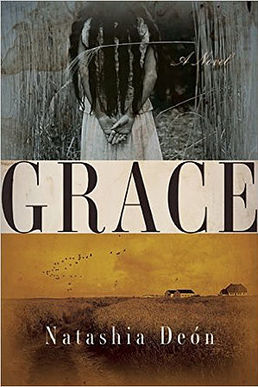Natashia Deón on the Ambition of Writing What Haunts You
An Interview with novelist Natashia Deón by Kathlene McGovern
|
Natashia Deón is a 2017 NAACP Image Award nominee and her novel, GRACE (Counterpoint Press) was named Best Book of 2016 by both the New York Times and the Kirkus Review. A practicing attorney, law professor, and creator of the popular L.A.-based reading series Dirty laundry Lit, Deón earned her MFA in creative writing from the University of California Riverside – Palm Desert. She is the recipient of a PEN Center USA Emerging Voices Fellowship. Her writing has appeared in American Short Fiction, Buzzfeed, LA Review of Books, The Rumpus, and other places. Learn more about Natashia Deón at her website: www.natashiadeon.com
In October, 2017 Natashia Deón spoke with Inscape short-fiction editor Kathlene McGovern, via email, about the desire of human nature, the “flavor” of language and an artist’s “use of everything” when crafting story.
|
Kathlene: In a review of your novel GRACE, the New York Times called you “a graphic and unsparing storyteller” and it’s easy to see why. From its first moment your novel pulls the reader in with language that is poetic, almost mystical and yet incredibly brutal. You clearly love language. How important, how primary, do you think the crafting of language is in storytelling and why?
Natashia: I think it was Toni Morrison who said, "I love the English language. It will do anything." I love that truth. There's freedom in it. It means I can flavor my language on the page and in life with words I create, or I can pass along language that was given to me. And on the page, language is craft, maybe more so in a historical novel.
Natashia: I think it was Toni Morrison who said, "I love the English language. It will do anything." I love that truth. There's freedom in it. It means I can flavor my language on the page and in life with words I create, or I can pass along language that was given to me. And on the page, language is craft, maybe more so in a historical novel.
True to her innate eloquence, Deón went on to explain that in GRACE, language “was a function of world building, trial and error.”
How close to the original language pattern and colloquialisms could I go without losing readers? Well, "losing" is the wrong word. I wanted to keep readers engaged while staying true to my characters and time and not have my writing read like "writing" but something more effortless, something readable, understandable and relatable. But no writer has to make it easier.
Kathlene: Who are your favorite writers?
Natashia: I have so many favorite writers from Dr. Seuss to Sapphire, Gloria Naylor and Kaitlyn Greenidge, Rebecca Solnit and Cormac McCarthy...the writers of the Bible. And there are so many more.
Kathlene: Who’s most inspired you?
Natashia: Who inspires me at any given moment changes with what's going on in my life or in the world in general. When I want to cry, I read poems by Chiwan Choi, or when I need grounding, I'll pick up a book by Roxane Gay. And some days, I read the Bible. I need Jesus, er' day.
Kathlene: Who are your favorite writers?
Natashia: I have so many favorite writers from Dr. Seuss to Sapphire, Gloria Naylor and Kaitlyn Greenidge, Rebecca Solnit and Cormac McCarthy...the writers of the Bible. And there are so many more.
Kathlene: Who’s most inspired you?
Natashia: Who inspires me at any given moment changes with what's going on in my life or in the world in general. When I want to cry, I read poems by Chiwan Choi, or when I need grounding, I'll pick up a book by Roxane Gay. And some days, I read the Bible. I need Jesus, er' day.
One of the most striking things about GRACE is the energy and life that comes off the page in a story where the narrator is dead. Perhaps it’s because Deón imbues non-human entities, such as the town of Tallassee, with human and specifically feminine characteristics in lines like: “Tallassee is finding her way. Reclaiming her land. There’s no one to cut her to pieces or temper her spirit.”
When speaking about the time during her pregnancy with her second child, Deón has been quoted as saying she and her husband were living the typical “American dream.” Shortly after her son’s birth, he was diagnosed with succinic semialdehyde dehydrogenase deficiency, a rare disorder that can cause a variety of neurological problems and developmental delays, especially involving speech development. His diagnosis caused a shift in her life and her desires.
Kathlene: In other interviews you’ve spoken about health challenges your son has faced and your challenge in getting physicians to listen to you when you knew something was wrong before they did.I’m wondering if you’d speak about how challenges in your life have opened you up to moments of creativity and (if they have) how did that happen for you? How would you encourage that in other writers?
Natashia: Maybe all artists use everything. And if they don't, they should. And by everything I don't mean for them to retell their experiences. I don't, though I'm often asked that question because, in fiction, I'll play with experiences I've known and I'll live in those memories again. In GRACE I wanted there to be a child who was a hero and for my son, I wanted that child to also be disabled as he is. I hadn't seen in literature a heroic black child who was disabled--heroism is relative--and I wanted my son to know who he is to me. So to writers I say, if a memory or an emotion or something unsaid is lingering, especially if it's haunting, it's probably worth your effort because it wants to live again.
Kathlene: Recently another visiting writer to PCC talked about “ambition of technique.” I’m wondering what you would term as “ambition of technique?” And are there any specific means you’d suggest for writing students to begin to explore that for themselves?
Natashia: Only you can tell your story the way you would. Only your brain works in the peculiar way that it does--it is your unique chemistry and genetics and experiences and more. And if you die before it's told, your story dies with you. So tell your story as only you would or could. That's ambitious.
Kathlene: You’ve said that you didn’t want GRACE to solely be an exploration of freedom and the state of being enslaved during the time periods in which it takes place but also of freedom in the present day. What do you see as the habits of burgeoning writers that tend to constrict their creative freedom and how would you encourage young writers to explore their freedom on the page?
Natashia: Write as if no one you know will ever read it...or know it was you, if they did. On the page, that's how I write. Anonymous to the world. Of course, I'm only fooling myself temporarily; long enough to write what I want, or what I must. Freedom is about pushing through barriers. If yours is fear, find your way around it, however you need to trick yourself and then it's done.
Natashia: Maybe all artists use everything. And if they don't, they should. And by everything I don't mean for them to retell their experiences. I don't, though I'm often asked that question because, in fiction, I'll play with experiences I've known and I'll live in those memories again. In GRACE I wanted there to be a child who was a hero and for my son, I wanted that child to also be disabled as he is. I hadn't seen in literature a heroic black child who was disabled--heroism is relative--and I wanted my son to know who he is to me. So to writers I say, if a memory or an emotion or something unsaid is lingering, especially if it's haunting, it's probably worth your effort because it wants to live again.
Kathlene: Recently another visiting writer to PCC talked about “ambition of technique.” I’m wondering what you would term as “ambition of technique?” And are there any specific means you’d suggest for writing students to begin to explore that for themselves?
Natashia: Only you can tell your story the way you would. Only your brain works in the peculiar way that it does--it is your unique chemistry and genetics and experiences and more. And if you die before it's told, your story dies with you. So tell your story as only you would or could. That's ambitious.
Kathlene: You’ve said that you didn’t want GRACE to solely be an exploration of freedom and the state of being enslaved during the time periods in which it takes place but also of freedom in the present day. What do you see as the habits of burgeoning writers that tend to constrict their creative freedom and how would you encourage young writers to explore their freedom on the page?
Natashia: Write as if no one you know will ever read it...or know it was you, if they did. On the page, that's how I write. Anonymous to the world. Of course, I'm only fooling myself temporarily; long enough to write what I want, or what I must. Freedom is about pushing through barriers. If yours is fear, find your way around it, however you need to trick yourself and then it's done.
Pasadena City College’s writer-in-residence, Natashia Deón will conduct a writing workshop on October 17, 2017 in the Circadian Room from 12-1pm and on October 19, 2017 she will read from her critically-acclaimed novel, GRACE, with a book signing to follow, in the Creveling Lounge from 1-2pm. These events are open to the public and supported with a grant from the Pasadena Festival of Women Authors.


